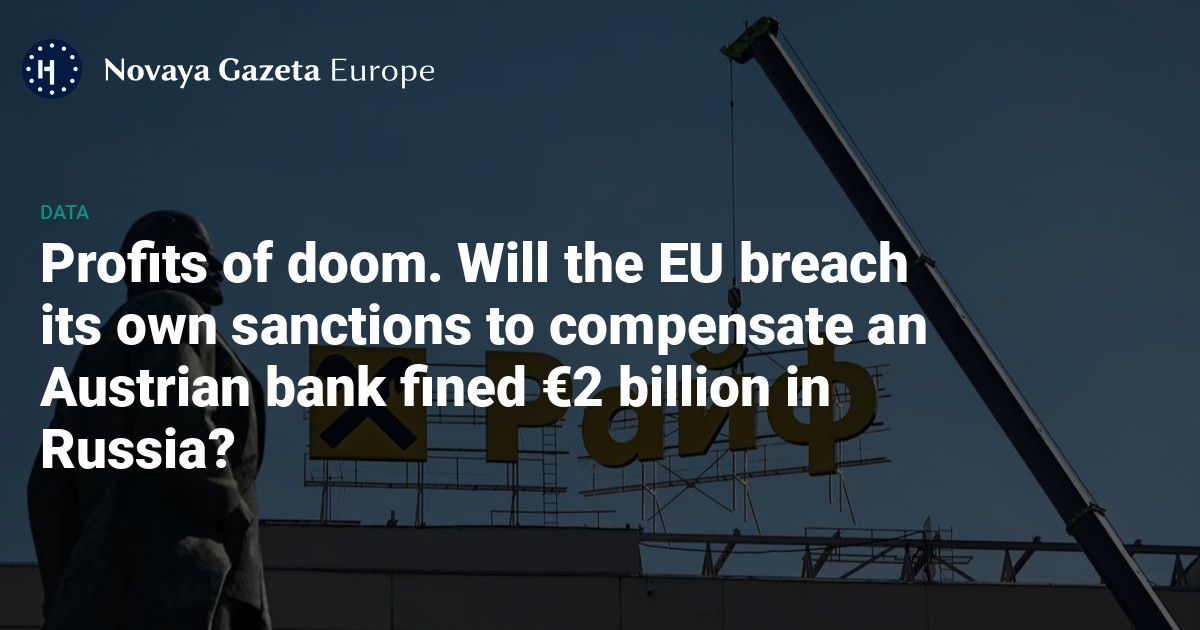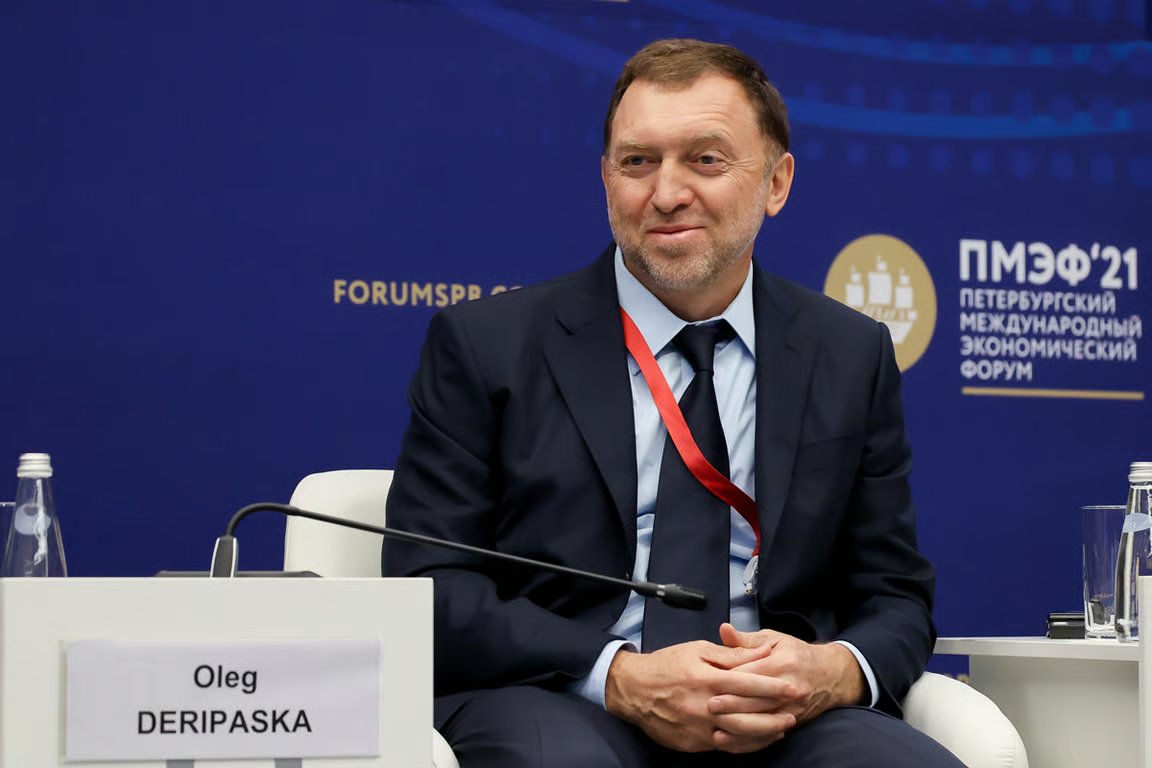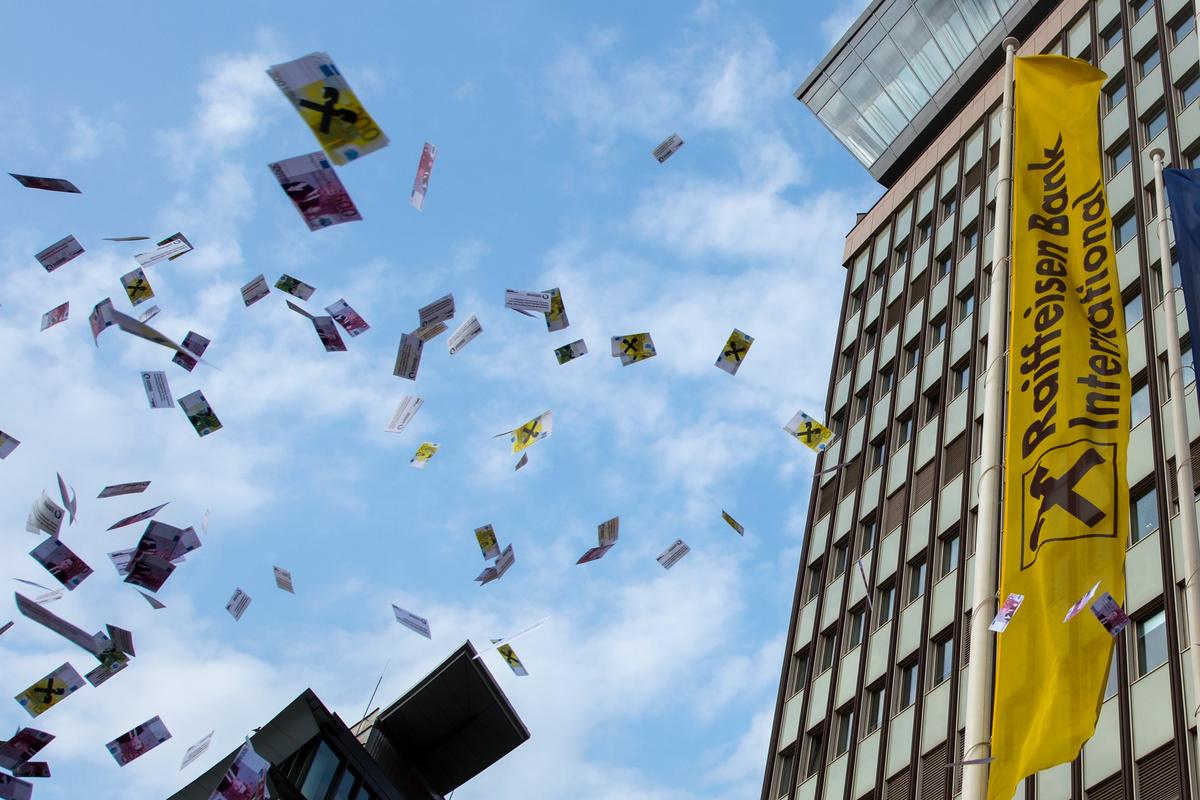


Vienna has requested that the European Union transfer frozen assets associated with Russian oligarch Oleg Deripaska to Austria’s Raiffeisen Bank to compensate it for a €2-billion fine levied on it by a Russian court. If Brussels agrees, it will set a dangerous precedent and embolden the Kremlin to seize the assets of foreign companies operating in Russia unless other Western sanctions on Moscow are lifted.
Vienna has requested that the European Union transfer frozen assets associated with Russian oligarch Oleg Deripaska to Austria’s Raiffeisen Bank to compensate it for a €2-billion fine levied on it by a Russian court. If Brussels agrees, it will set a dangerous precedent and embolden the Kremlin to threaten to seize the assets of foreign companies operating in Russia unless other Western sanctions on Moscow are lifted.
The EU is currently wrangling over its 19th package of sanctions on Russia. According to the Financial Times, one of the sticking points preventing their finalisation is an Austrian proposal to unfreeze shares in the Austrian construction company Strabag, which may be tied to Deripaska.
Raiffeisen CEO Johann Strobl says the assets should be unfrozen because that would be in the EU’s own interests, but a number of European countries oppose that proposal, according to the FT.
It represents yet another attempt by the Austrian authorities and Raiffeisen Bank to do what they have been trying to do since the beginning of the war, namely to repatriate at least some of the fast-shrinking profits earned by its Russian subsidiary since the start of the war in Ukraine, which have already halved this year due to the €2-billion fine.
With profits of €3.3 billion, Raiffeisen Bank in Russia generated over half the net income of Raiffeisen Bank International (RBI) in 2022 and 2023, but it was unable to access them after the Central Bank and Vladimir Putin banned dividends and profits being transferred to “unfriendly” states following the invasion of Ukraine. Unsurprisingly, the bank has been attempting to resolve the situation ever since.
A first attempt to do so in 2023 ended in failure when Raiffeisen was unable to reach an agreement with Rasperia Trading, a Russian investment company once owned by sanctioned Russian oligarch Oleg Deripaska, on acquiring its 27.78% stake in the Austrian construction group Strabag.

Oleg Deripaska. Photo: Sergey Kulakov / Roscongress
As Rasperia is registered in Russia, the ban on repatriating money wouldn’t have stopped Raiffeisen Bank’s Russian subsidiary buying the €1.51-billion stake. Having received the shares, it could then have transferred them to its parent group RBI in the form of dividends.
The deal was blocked by Western regulators, partly due to US concerns — despite Deripaska’s denial of any connection, the Biden administration was unsettled by his connection to the Rasperia assets in Strabag, although, immediately after the announcement of the RBI deal, it was clear from the Strabag website that Deripaska was associated with the asset via multiple intermediary companies.
In March 2024, Strabag announced that Deripaska had relinquished control over his share in the construction group. However, that still didn’t help RBI seal the deal, as the US authorities announced two months later that there had been no real change of ownership.
The US Treasury saw the transfer of ownership of Rasperia to businessman Dmitry Beloglazov, the founder of the Erich Krause stationery brand, as little more than a typical ruse for circumventing sanctions, whereby billionaires leveraged “complex ownership structures to disguise their connections to particular assets or entities” and used “enablers to aid evasion efforts”. The US duly imposed sanctions on Rasperia, Beloglazov and two of his other companies.
“Should the EU agree, dangerous precedents could be set, and the already questionable effectiveness of European sanctions on Russia could be further called into question.”
When the deal was blocked, Raiffeisen Bank received an arbitration claim from Russia’s Kaliningrad region demanding €2 billion in compensation from Rasperia for the failure of the transaction to go through.
After Russia’s Central Bank awarded Rasperia €2 billion of Raiffeisen Bank’s money in mid-2025, the Austrian government thought it only logical to ask the EU to unfreeze the Strabag assets and hand them to RBI in order to plug a hole equivalent to almost 2.5 times the bank’s 2024 profits. But should the EU agree, dangerous precedents could be set, and the already questionable effectiveness of European sanctions on Russia could be further called into question.
This would effectively mean the EU complying with a Russian court decision “meant to extort a Western business for complying with sanctions demands”, Maximilian Hess, a foreign trade and sanctions researcher at the Foreign Policy Research Institute, told Novaya Europe. It would also have the effect of “legalising the exchange of the value of Strabag’s shares for money to ultimately flow to Deripaska [and] parties related to him in the Rasperia chain”, he added.
Russian anti-corruption expert Ilya Shumanov agrees. “In fact, it is a tool for legitimising the return of assets to Moscow. It creates an opening for potential corruption loopholes, because it makes it about lobbying, and business figures exerting pressure on the state for their own benefit,” he told Novaya Europe.
It could be a test case for the Kremlin. According to Leave Russia, a campaign group monitoring corporate withdrawals from Russia run jointly by the Kyiv School of Economics and a team of Ukrainian IT professionals, about 1,900 foreign companies continue to work in Russia, including hundreds of large Western corporations such as Pepsi, Japan Tobacco, Procter & Gamble and Metro.
Shumanov says he fears that, spurred on by its success with Raiffeisen, Moscow may carry on in the same vein, seizing foreign assets in Russia and then exchanging them for frozen Russian assets abroad, only increasing the risks foreign business owners in Russia face.
The US, which is already frustrated by Europe’s continued purchase of Russian oil and liquefied natural gas, which it rightly argues is directly financing Putin’s war, is likely to voice its opposition to any EU approval of the deal.
There can be no happy end to this story. It is bad optics, politically, to unfreeze the assets and hand them to Strabag. As Shumanov says, it “undermines sanctions and creates grounds for discord within the EU”, because if one country gets to work around the rules, others will suggest lifting sanctions on other Russian oligarchs too.

A protest against money laundering in front of the headquarters of Raiffeisen Bank International in Vienna, Austria, 6 April 2016. Photo: EPA / Christian Bruna
Yet the loss of €2 billion could threaten the stability of RBI, one of the largest banks in Austria, and although the bank has promised on several occasions that it would end its operations in Russia, it now quotes the current situation as one of the reasons it can’t. The loss of its large-scale Russian business could threaten the sustainability of the entire group, and would mean Europe having to recapitalise the bank.
At the beginning of the war, like many other companies, RBI published a cautious statement about leaving Russia, which it has since removed from its website. Since then, the bank has repeatedly talked of exit strategies, including splitting up or selling off its Russian business interests, but has also repeatedly failed to act.
The European Central Bank has also instructed the bank to scale back its operations in Russia. Raiffeisen did speak to multiple potential buyers in 2023 and 2024, but each deal was blocked either by the EU or the Russian authorities, with Moscow blocking another this year. This month, the bank reported that it was still negotiating the sale of its Russian subsidiary.
If Raiffeisen does decide to leave Russia, it will most likely lose its business without receiving any compensation.
Hess cautions Europe not to hand anything to Russian oligarchs on a plate and says it should instead encourage Raiffeisen to leave Russia. “That will have a material impact on the parent RBI’s finances, of course,” he says. It is extremely unlikely that the Russian authorities would allow any such deal. For them it is of utmost importance to maintain a financial channel for communication with the outside world, particularly to receive Europe’s payments for liquefied natural gas. The EU will need to keep buying the fuel from Russia for at least another two years, according to Reuters.
So if Raiffeisen does decide to leave Russia, it will most likely lose its business without receiving any compensation. If that is “enough to impact the bank’s creditworthiness overall, … I could see the argument for Europe using funds, including the proceeds of seizing frozen funds, to help ensure its continued solvency, but that should only be … if it is indeed pulling out of Russia for good,” Hess says.
One major issue, according to experts who spoke to Novaya Europe for this story, is that both Austria and RBI are keen to remain an open channel of communication between Russia and the West now that most other foreign banks have left Russia or are winding down their operations there. The friendship between Vienna and Moscow began in the Soviet era and, off the record, many Austrian officials say they want to maintain relations while they wait for a new détente. Paying into Russia’s war coffers appears not to be too high a price to pay for remaining the largest foreign bank in Russia.

